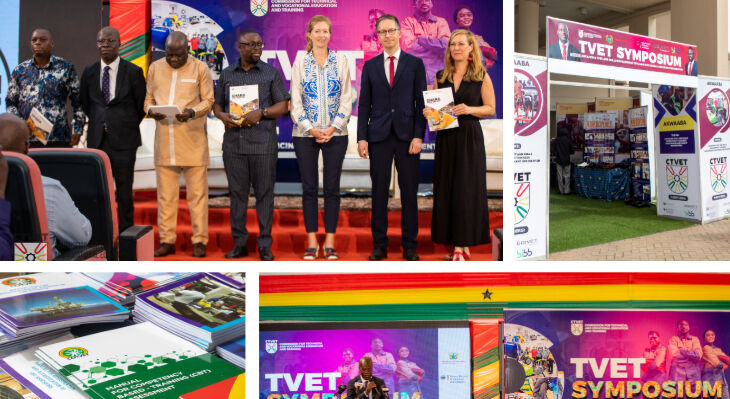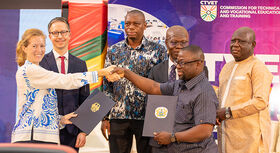First TVET Symposium in Ghana is a complete success
31.05.2024
At the first TVET Symposium in Ghana, the CVET joined forces with GOVET and the BMBF to stage an impressive programme which also included the presentation of a Declaration of Intent for further bilateral cooperation in vocational education and training and the launch of Ghana’s second Vocational Education and Training Report.

At the first TVET Symposium in Ghana, Professor Marc Adom Asamoah, the STEM Ambassador* at the Ghanaian Ministry of Education, also stated that the importance of vocational education and training in Ghana is gathering considerable steam. The successful development of the Ghanaian VET system over the past years is obvious to see. Dr. Fred Kyei Asamoah, Head of the National Commission for (CTVT), stressed just how productive collaboration with BIBB and GOVET is proving to be. Constant networking and continuous support from GOVET had already borne significant fruit. Two vocational education and training reports, a study trip to Germany, training courses in the area of organisational development and data management had been just some of the achievements. Nevertheless, Dr. Asamoah stressed that improvements were still needed in areas such as equipment at vocational schools and teacher training. This would constitute a future task.
Sivine Jansen, Germany’s Deputy Ambassador to Ghana, and Alexander Hochradel from the Federal Ministry of Education and Research (BMBF) also highlighted the importance of bilateral VET cooperation in their welcome address at the start of the symposium.
For us, vocational education and training is the cornerstone of bilateral cooperation between our two countries, although we accept that this is a complex and multi-layered topic.
Sivine Jansen, Germany’s Deputy Ambassador to Ghana
The first TVET Symposium was collectively organised in Accra by the CTVET, the Ghanaian Ministry of Education, GOVET and the BMBF. Representatives from the fields of research and practice and from companies convened to witness the publication of Ghana’s second Vocational Education and Training report and the extension of cooperation between the ministries of education of Germany and Ghana as part of a diverse conference programme.
Since the start of collaboration between our two ministries of education in 2019, we have been able to establish a basis of trust and produce very good results.
Alexander Hochradel, Senior Policy Officer of International Vocational Education and Training Cooperation and Erasmus+ Division at the BMBF

The mixture of presentations and podium discussions offered by the symposium on the topic of “Advancing TVET and skills development towards sustainable and decent job creation” made for a varied and content-rich programme. Dr. Faustina Emefa Agordah from Takoradi Technical University presented a follow-up study of vocational school pupils in the textile sector. This study indicates that 71 percent of those completing VET go on to become self-employed. However, they also face subsequent challenges with regard to price setting, work organisation and customer communication. Dr. Agordah stated that these were all areas in which training needed to be stronger.
Dr. Léna Krichewsky-Wegener, who joined the event remotely from Germany, spoke about a study by the Institute for Innovation and Technology (IIT) on the use of smart phones in the informal sector in countries including Ghana. The main thrust of this study had been to look at the extent to which digital technologies are being deployed for the learning and imparting of content in the informal sector. The results showed that 77 percent of trainees in the informal sector in Ghana are using smart phones. The initiative shown by trainers is, however, frequently key in determining whether learning takes place via the right materials.
In the podium discussions, representatives from the Technical Universities, Sector Skills Bodies, VET institutions and employer associations debated the role of technical innovations in VET and the part played by vocational education and training in reducing youth unemployment and in creating quality jobs. Participants arrived at the unanimous view that integration of industry into vocational education and training must be reinforced. The remit of the state also included the resolution of hurdles such as complicated insurance arrangements for trainees. The VET institutions also needed to provide training which is more closely aligned to the requirements of companies. The consensus was that data is an important topic in terms of having a valid decision-making basis.
-
*
STEM Ambassador refers to the international designation of Ambassador of Science, Technology, Engineering, and Math.